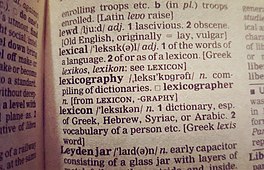Documentation:RelLex/A Dictionary of Creek/Muskogee: With Notes on the Florida and Oklahoma Seminole Dialects of Creek
A Dictionary of Creek/Muskogee: With Notes on the Florida and Oklahoma Seminole Dialects of Creek
| Relational Lexicography Knowledgebase | |
|---|---|

| |
| About RelLex | |
| An index of under-resourced North American language references, including print and digital dictionaries. | |
| Browse by | |
| About the Knowledgebase | |
| Find our filterable Knowledgebase of dictionaries and lexicography technology at https://knowledgebase.arts.ubc.ca/. | |
Language Name
Creek-Seminole.
Alternate Language Names
Creek, Mvskoke, Muscogee, Muskogee.
Region
Oklahoma, Alabama, Georgia, and Florida, United States.
Who
Jack B. Martin (linguist, author); Margaret Mauldin (speaker, author).
Others Involved
Linda Alexander, Edna Bear, Rosie Billie, Abraham Bunny, George Bunny, Helen Bunny, Joanna Freeman, Felix Gouge, Juanita Harris, Toney Hill, Shula Jones, Willie Lena, Juanita McGirt, Walter McGirt, Lucy McKane, John Pigeon, Sarah Sampson, Alice Snow, Tim Thompson, Mary Lee Walker, Nettie Walker, Robert Washington (contributors); Joyce Bear, Hal Brightcloud, Aaron Broadwell, Alan Cook, Virginia Crowell, Jenniver Davis, Louise Gopher, Heather Hardy, Allen Harjo, Mekko Lewis, Mary Linn, Gloria and Michael McCarty, Jesse Mercer, Tim Montler, Pam Munro, Jessie Shore, David Skeeter, Tim Thompson, Madeline Tongkeamha, Akira Yamoto (unspecified assistance); Mary R. Haas, David Cline, Willem de Reuse, Bill Sturtevant (field notes); Don Hardy (assistance with older texts); Deanna Mauldin (illustrations); Oklahoma Native American Language Development Institute (orthographic assistance); Norman Tribbett, Louise Gopher, Jennie Shore, Sarah Sampson, Susan Stans (connections); Mary Frances Johns (vocabulary); Stuart Hannah (pilot survey); Doug Parks, Jeanette Nakada (editorial advice).
UCLA Linguistics Department, University of North Texas, the Whatcom Museum, Phillips Fund of the American Philosophical Society, College of William and Mary, National Endowment for the Humanities (funding).
Publishing Information
This dictionary was published in 2000 by University of Nebraska Press.
How People are Cited
Speakers are cited under Contributors. Editors and assistants are cited under Acknowledgements.
How Information is Cited
Previous works and documentation referenced and used in the creation of this dictionary are cited under Sources in the Introduction.
Where is Information Coming from
Many of the entries in this dictionary were compiled using existing and previously published Creek lexical materials, primarily materials compiled by Reverend Robert M. Loughridge and David M. Hodge which were originally published in the 1890 English and Muskokee Dictionary. The authors drew from previous documentation in Creek, translated with the help of speakers who also shared their own stories and words.
Tools and Framework used
This dictionary is available as a physical book.
Access
This dictionary is available through libraries.
Included Languages and Directionality
Creek to English, English to Creek.
Dialects Included
This dictionary includes Muskogee, Oklahoma Seminole, and Florida Seminole Creek.
Type of Dictionary
This is a bilingual, bidirectional dictionary.
How are Entries Organised
This dictionary is organised into four many sections. Entries in all sections include both what is referred to as a canonical spelling and a transcription which uses a system developed specifically for Creek developed by Mary Haas (rather than IPA or another more widely used transcription system).
The first section is the Creek-English section, which is organised alphabetically by Creek headword. Grammatical information is noted in verb, adjective, and noun entries. Whether or not entries only appear in older sources is also notes in entries. Practical English definitions are included with each entry. At the bottom of each page is a pronunciation guide for the letters used in Creek, with the Creek letter in bold, the IPA in forward slash brackets, and an English word with the described sound underlined.
Topical Information is a list of words organised by theme. Months, Days of the Week, Seasons, Common Clans, Traditional Dances, Books of the New Testament, Numbers, Age, and Principal Chiefs are organised in two columns with English on the left and Creek on the right. Common Expressions are organised in the reverse, with Creek on the left and English on the right.
Part three, Place Names, is organised alphabetically by Creek name, followed by the English description of the place and the source of the name from the bibliography.
Part four, English-Creek, is organised alphabetically by English headword. Following each headword is a short definition and the Creek equivalent(s) in both orthographies.
There is also a section for common affixes in the Appendix, organised alphabetically by Creek. Each entry contains the English definition and how it attaches to root words. Following the appendix are illustrations and photographs of important cultural objects and places.
Other Features
| Feature | Included | More Information |
|---|---|---|
| Guide to use and understand | ✅ | In the Introduction |
| Audio | ❌ | |
| Images | ✅ | A map, photographs, and line drawings depict aspects of Creek culture |
| Example phrases | ❌ | |
| Speakers marked | ✅ | Marked with relevant entries |
| Dialects marked | ❌ | Dialects are listed with the speaker |
Other Notes
This dictionary was digitized in 2013. It is difficult to determine exactly how much of the original dictionary was retained in the digital version, or how much information was added.
External Links
Reference on WorldCat: https://www.worldcat.org/title/43561668
A review of this dictionary from Edward Vajda is open access on Research Gate: https://www.researchgate.net/publication/249903454_A_Dictionary_of_CreekMuskogee_with_Notes_on_the_Florida_and_Oklahoma_Seminole_Dialects_of_Creek_review
The review is also accessible on Project Muse with login credentials: https://muse.jhu.edu/article/19444/
A version of this dictionary open access online on Webonary: https://www.webonary.org/muscogee/overview/credits-acknowledgements/